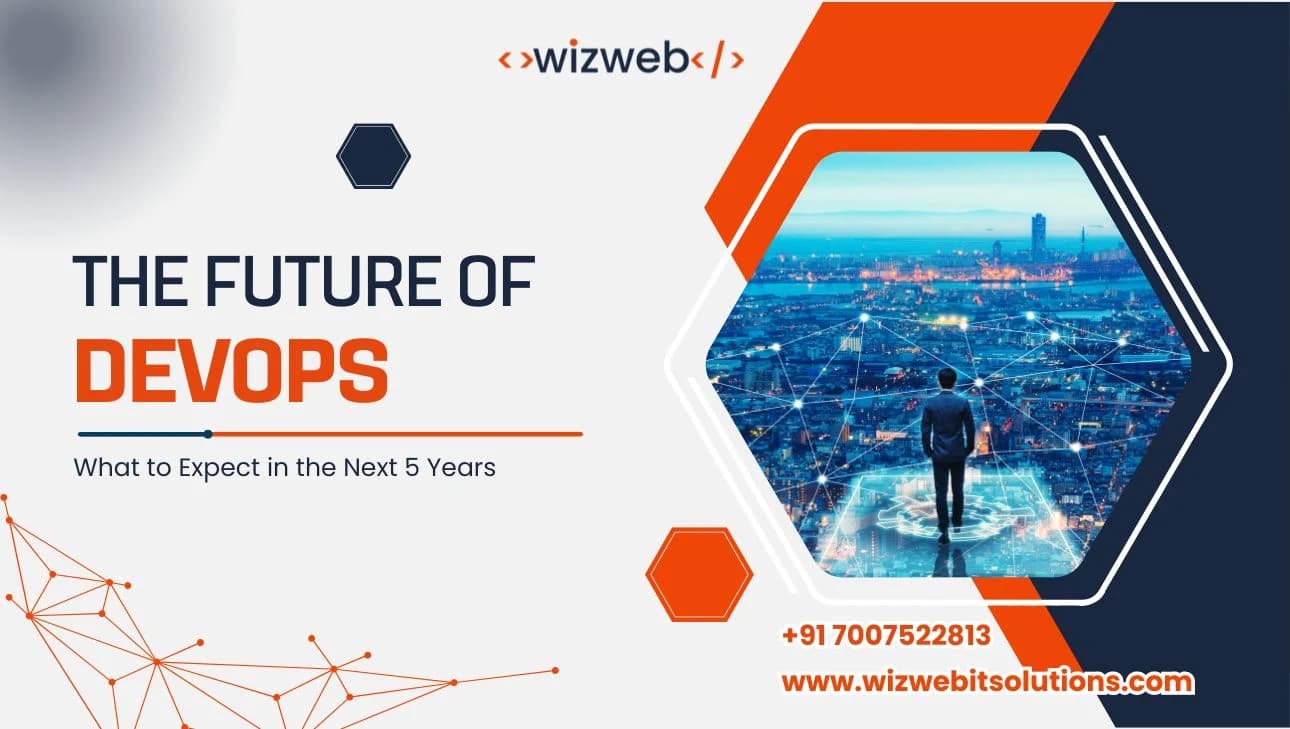Get in Touch
- Phone
+91 700 752 2813
- Email Now
hello@wizweb.in
Office No - 204 A-140, Sector 63 Road Noida, Uttar Pradesh 201301

The phrase Future of DevOps is more than a buzzword — it describes real changes that will shape how teams build and run software. Whether you work in a small startup, run a product team, or hire DevOps Services, understanding the Future of DevOps will help you make better choices about people, tools, and processes.
When we say the Future of DevOps, we mean how the job of delivering software will change. This includes new tools, smarter automation, stronger security, and ways teams organize their work. Over the next five years, DevOps will become smarter, more product-focused, and more tied to business goals. In short, DevOps will be less about manual tasks and more about helping companies deliver value faster and safer.
A big part of the Future of DevOps is AI. Expect systems that can read logs, spot problems, suggest fixes, and even roll back bad releases automatically. This is often called AIOps. For engineers, that means fewer late-night emergency fixes and more time to plan and build new features. If you buy DevOps Services, ask how they use AI tools — small automations first, then larger ones once you trust the results.
In the Future of DevOps, Git will act as the single source of truth. This practice, known as GitOps, keeps infrastructure and application changes in the same place. That makes deployments repeatable and easy to audit. For teams, GitOps reduces mistakes and helps when many people work on the same system. When selecting DevOps Services, make sure GitOps or similar practices are part of the package.
Platform engineering is rising fast. The Future of DevOps will include internal developer platforms that make it simple for product teams to deploy code without managing every detail. Think of an internal platform as a toolbox: developers pick what they need and focus on building features while the platform team maintains standards and safety. Companies that invest in these platforms often deliver faster and more reliably.
Security will no longer be an afterthought. The Future of DevOps means security checks happen in every pipeline step — from code scanning to infrastructure checks and runtime protections. This approach keeps releases quick but safer. If you engage DevOps Services, ask how they integrate security into your CI/CD pipeline instead of adding it at the end.
Kubernetes and cloud-native tools will stay important, but the Future of DevOps will also include multi-cloud and edge strategies. Teams will need automation that works the same way whether an app runs in a public cloud, private cloud, or at the edge. This flexibility reduces vendor lock-in and lets teams put workloads where they perform best. DevOps Services providers will need skills across clouds and edge platforms to help with this shift.
Watching a system is different from understanding it. In the Future of DevOps, observability becomes central. Observability combines logs, metrics, traces, and user signals so teams can find the real reason behind a problem. Good observability shortens outage time and helps teams measure how users are affected — not just whether something is down.
Machine learning is a part of many products now. The Future of DevOps includes close ties with MLOps so models are versioned, tested, and deployed like code. Treating models as artifacts helps with traceability and governance. When looking for DevOps Services, consider vendors who can handle both software and ML pipelines.
If you plan to hire DevOps Services or grow your team, look for people who can code and think about systems. The Future of DevOps favors engineers who understand software, infrastructure, and product goals. Roles will blend — SREs, platform engineers, and DevOps engineers will work together closely. Communication and simple documentation will be just as important as technical skill.
The Future of DevOps is about delivering software faster, safer, and in closer alignment with business needs. Over the next five years, expect AI-driven automation, GitOps, platform engineering, built-in security, and better observability to shape how teams work. Whether you adopt these changes inside your company or use expert DevOps Services, preparing now will reduce fire-fighting and give your team more time to build the features customers love.